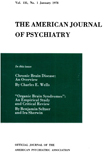PASTORAL-PSYCHIATRIC WORKSHOPS: THE ST. JOHN'S MENTAL HEALTH INSTITUTE
Abstract
It is conceived that the pastor has important duties of counseling to perform for his parishioners in addition to his service as spiritual leader and advisor. Undoubtedly, this part of his work could be performed better if he could have some of the benefit that the psychiatrist has gained through his experience in treating patients. Particular advantage would come from the judicious use of the technics of interviewing and from the feeling and understanding that result from seeing more clearly the roots of human behavior. If he were so prepared for counseling troubled people, the pastor could give advice on the basis of more adequate information, thus avoiding pitfalls and obtaining positive advantages for the person he advises.
The implication of these premises was that a means of communication with an approach to optimal control but without denominational restrictions had to be found. A workshop in a location remote from distracting influences with residency there as a group for nearly a full week was decided upon as the best means of meeting the required conditions. No similar workshop approach had been attempted. Other considerations were the inclusion of a sufficient number of participants for each workshop, and a sufficient number of repetitions of the workshops for purposes of comparison and gradual adjustment of details of operation as experience increased. The history of 9 workshops, each including about 40 pastors and about 10 faculty members, three each summer during 3 consecutive weeks and in 4 consecutive years at St. John's University at Collegeville, Minnesota, has been given.
Evaluation of results is going on as the fifth series of workshops is being planned. It is believed that the participants have derived a number of important benefits. Some of these are of an intellectual and informational kind. Some concern an increased skill in the use of technics, particularly in interviewing. Probably most important of all is an inner modification of feeling and understanding, a sincerely experienced change in ideas and conviction about the great importance of unconscious motivation and the evidences and means by which it is revealed. There is also a realization of an increased power to help through the possession of such understanding. It cannot be claimed that these changes occur uniformly in all participants, or, indeed, that many of them occur at all in some participants. The faculty is convinced that no participant can go through the workshop experience entirely unaffected ideationally and emotionally. Most of the pastors admit readily that they have gained considerable benefit from their attendance in one or more of the respects that have been mentioned and most importantly in the last respect–a useful and yet disturbing knowledge that the hidden springs of motivation in the natural man must be correctly gauged before he can be given intelligent help.
Access content
To read the fulltext, please use one of the options below to sign in or purchase access.- Personal login
- Institutional Login
- Sign in via OpenAthens
- Register for access
-
Please login/register if you wish to pair your device and check access availability.
Not a subscriber?
PsychiatryOnline subscription options offer access to the DSM-5 library, books, journals, CME, and patient resources. This all-in-one virtual library provides psychiatrists and mental health professionals with key resources for diagnosis, treatment, research, and professional development.
Need more help? PsychiatryOnline Customer Service may be reached by emailing [email protected] or by calling 800-368-5777 (in the U.S.) or 703-907-7322 (outside the U.S.).



